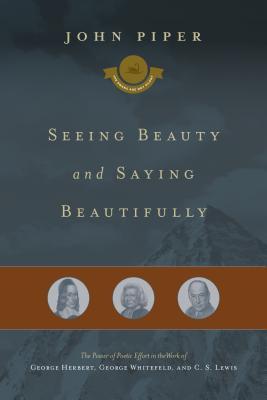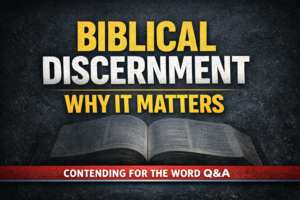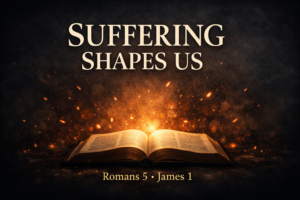⏱️ Estimated Reading Time: 5 min read
Writing articles and speaking to people has been a big part of my life since my teenage years. Ever since that time, I’ve loved writing Christian articles, speaking to God’s people, and ministering to them through the written word and through preaching and teaching. This is why when I saw John Piper’s Seeing Beauty and Saying Beautifully: The Power of Poetic Effort in the Work of George Herbert, George Whitefield, and C.S. Lewis, I knew I needed to read it. Words and ideas matter. As Christians, we are to use our words in a manner that builds up others in the grace of God.
Dr. Piper starts this book with a helpful exploration on whether Christians should use lofty or eloquent speech. This helpfully sets forth the point of the book which is to help Christians to use their words well in whatever media they are using. Not only does Piper want us to understand what the Bible says about our words, he wants us to learn from how George Herbert, George Whitefield, and C.S. Lewis used their words as they sought to minister to people.
George Herbert
The first person that Dr. Piper considers is George Herbert. He was born in 1593 and died in 1633. Herbert worked as a public orator at Cambridge University and even served in pastoral ministry. He is remembered most for his poetry.
Dr. Piper explains, “The effort to say freshly is a way of seeing freshly. The effort to say strikingly is a way of seeing strikingly. The effort to say beautifully is a way of seeing beauty” (74). Piper also notes, “Getting glimpses of glory in the Bible or in the world and turning those glimpses around and around in your mind, looking and looking. And for Herbert, this effort to see and savor the glory of Christ was the effort to say it as it had never been said before” (74).
Lastly, Piper explains, “The effort to put the excellencies into worthy words is a way of seeing the worth of the excellencies. The effort to say more about the glory than you have ever said is a way of seeing more than you have ever seen”(76).
George Whitefield
For those unfamiliar with Whitefield, he was one of the most important preacher-evangelists the Lord used during the First Great Awakening. His life and ministry transformed America at the time and was used to spark a revival on both sides of the Atlantic. There’s so much that we can learn from Piper’s treatment on Whitefield but what I took from it was how Whitefield’s preaching was “doctrinally specific and not vague” (99).
Whitefield preached to large crowds often in city squares or even in country fields. He didn’t have a microphone or any amplification. He not only preached without these modern and helpful technologies but as Piper said he preached with great care and specificity. This is significant in our day because we aren’t to preach our opinions. Instead, we are to preach the Word.
As Christians today, we should model Whitefield and preach doctrinally specific sermons from the Word of God. We should also engage and speak to issues inside and outside the Church with the Word of God. This will help God’s people grow in their understanding of the Word and in their application of the Gospel.
C.S. Lewis
There is so much we can take away from C.S. Lewis and Piper’s explanation of him. Piper doesn’t gloss over Lewis weakness in his theology but he also doesn’t focus on them. Instead, Piper helps us learn not only about the weaknesses of Lewis but also his great strengths. Lewis great works such as the Chronicles of Naria, Mere Christianity, and many others help us to learn how to use our words with excellence to the glory of God.
Final Thoughts
The book concludes with a call to speak God’s Wonders in His Word and in His Word. Here Piper notes:
“The point of this book has been that finding worthy words for worthy discoveries not only helps others feel their worth but also helps us feel the worth of our own discoveries. Groping for awakening words in the darkness of our own dullness can suddenly flip a switch and shed light all around what it is that we are trying to describe and feel. Taking hold of a fresh word for old truth can become a fresh grasp of the truth itself Telling of beauty in new words becomes a way of tasting more of the beauty itself” (144).
I read this book because I wanted to read not only about these men but to discover how to better see and say beautifully. As I’ve finished this book now and thought about what I read, I’ve been struck by Piper’s emphasis on the glory of God and on the need to continue to practice the spiritual disciplines in order to see and say beautifully.
It’s often easy for me to write words and put them together into an article or review. Yet, seeing and saying beautifully requires that I open the Bible, read, think, meditate, and apply the truth of Scripture to my life. I’m reminded afresh of this need for myself and encouraged to that end by Piper’s book and the men he describes in it.
Whether you write or speak for a living or just as a hobby, or you don’t at all there is a lot to take away from this treatment of Herbert, Lewis, and Whitefield. I personally love reading the stories of great saints and how their lives and ministries are relevant and needed today. I encourage you to pick up this great book and be encouraged that the same Lord who used Herbert, Lewis, and Whitefield can use you ordinary you in powerful ways for His glory.




